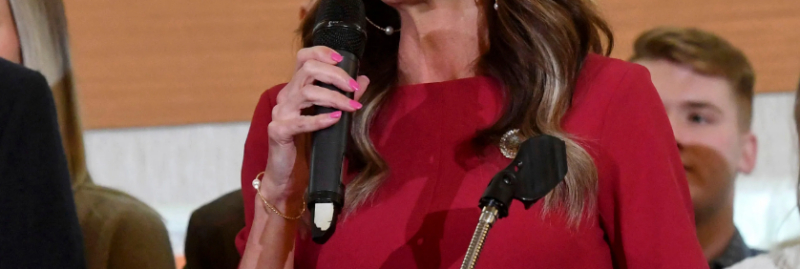Oglala Sioux Tribe Respond To Governor
A recent decision by the Oglala Sioux tribe has caused controversy in South Dakota following their announcement to ban Republican Gov. Kristi Noem from their reservation.
The ban was issued in response to Noem's stance on the ongoing border crisis, which the governor addressed in a joint session of the state's legislature. During her speech, Noem expressed her support for Texas Gov. Greg Abbott and his efforts to secure the border, citing the infiltration of cartels into tribal reservations as one of the main concerns.
The tension between state officials and the federal government over the border crisis has been escalating, with Noem and other Republican governors standing in support of Abbott's actions. In late January, the U.S. Supreme Court ruled in favor of the Biden administration, allowing them to remove razor wire from the border. This decision was met with backlash from GOP governors who believe the federal government is not doing enough to address the issue of illegal immigration.
However, the Oglala Sioux tribe expressed their disapproval of Noem's support of Abbott, particularly in regard to the use of razor wire. Tribal president Frank Star Comes Out criticized Noem for dehumanizing and mistreating the migrants who come to the border in search of a better life. He also pointed out that drug and human trafficking were larger issues that could not be attributed solely to the tribal reservations. In response to Noem's stance, the tribal president has banned the governor from entering their reservation, citing safety concerns for their community.
In her press statement, Noem called the ban "unfortunate" and accused the tribal president of bringing politics into the discussion. She reiterated her speech to the legislature, where she spoke about the devastation caused by drugs and human trafficking in the state, and how it had a particularly significant impact on tribal reservations. Noem emphasized that her comments were not meant to blame the tribes but to acknowledge the problem and work towards a solution.
The governor also clarified that her focus remains on collaborating with tribal leaders to address the issue of cartel activity and illegal immigration. She expressed her willingness to work with any of the state's Native American tribes to "build a relationship." However, tribal president Frank Star Comes Out took to social media to call for unity among tribes and the fight for equal rights.
The banishment of Gov. Noem from the Oglala Sioux reservation highlights the ongoing political divide in the state and the nation concerning the border crisis. Noem's speech and the subsequent ban have sparked intense discussions among politicians and citizens, with some supporting her stance and others criticizing it.
Questions have been raised about the use of razor wire at the border and its impact on migrant communities. The ban has also brought attention to the struggles faced by tribal reservations in South Dakota and the need for a united effort to address them.
This is not the first time Governor Noem has drawn criticism for her actions regarding the border crisis. In February, she sent 50 South Dakota National Guard troops to the border, a move that was met with opposition from some tribal leaders. They argued that the troops should instead be deployed within the state to address issues such as drug trafficking and domestic violence on reservations.
As the debate surrounding the border crisis continues, it is clear that there are differing opinions on how to address the issue. However, the banishment of Gov. Noem by the Oglala Sioux tribe has brought attention to the impact of the crisis on tribal communities and the need for a more comprehensive and collaborative approach to finding a solution. It remains to be seen how this decision will affect the relationship between the state government and Native American tribes in South Dakota.

